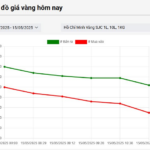General Secretary To Lam: “Eliminating State Monopoly on Gold Bullion”

On the afternoon of May 28, 2025, during a working session with the Central Committee for Policies and Strategies on the mechanism and policies for managing the gold market, General Secretary To Lam pointed out four major shortcomings: inflexible market management, existence of monopoly, failure to mobilize gold resources from the people, and outdated management methods that lag behind global trends.
The gold market is managed inflexibly and does not correspond to the global supply and demand dynamics, causing adverse effects on the economy, especially gold smuggling and outflow of foreign currency. It is necessary to shift the mindset from administrative control to a disciplined market approach, from “tightening to control” to “opening up to govern.”
According to the General Secretary, people’s gold hoarding is a legitimate form of saving and investment that should be respected and guided by appropriate policies. The aim is to effectively manage the gold market, stabilize the macro-economy, and mobilize resources for socio-economic development.
Establishing a Gold Exchange as a Core Solution
Assoc. Prof. Dr. Nguyen Huu Huan, lecturer at the University of Economics Ho Chi Minh City, opined that eliminating the monopoly on gold bullion production is necessary, as any sector dominated by a monopoly for too long carries inherent risks and hinders market development.

Assoc. Prof. Dr. Nguyen Huu Huan, Lecturer at the University of Economics Ho Chi Minh City
|
However, this elimination must be accompanied by stringent conditions regarding licensing and supervision. Enterprises wishing to engage in gold bullion production must meet technical and financial capacity standards and, more importantly, be subject to tight quality control by the authorities to prevent the past issue of under-karat gold.
Before the issuance of Decree 24, which granted SJC the exclusive right to produce gold bullion, the market witnessed instances of gold bullion manufacturers failing to ensure quality. Instead of the required 99.99% purity, they produced gold with only 99% or lower fineness, causing significant losses to consumers.
If Decree 24 is amended to allow multiple organizations to produce gold bullion, this activity must be considered a conditional business line. Not all entities can participate; they must possess production capacity and liquidity—meaning that they should also be able to buy back gold from the people according to regulations, avoiding the “issue and no buy-back” scenario, which poses risks to consumers.
Moreover, instead of solely focusing on ending the gold bullion monopoly, Mr. Huan suggested that establishing a gold exchange is a more fundamental solution. A well-regulated gold exchange—where authorized gold bullion producers can list and trade gold transparently according to quality standards—will ensure market efficiency and transparency. As a result, the demand for physical gold holdings will decrease, as individuals primarily invest in gold with the goal of “buying low and selling high.” A modern gold market will cater to this need without requiring people to hold gold at home.
According to Mr. Huan, a mechanism to mobilize gold from the people should be established, such as allowing the State Bank of Vietnam (SBV) to mobilize gold with interest. This will not only increase resources for economic development but also reduce pressure on foreign reserve requirements. When people deposit gold with the SBV, they benefit from both safety and interest earnings, eliminating the need to keep physical gold at home. Following the rule that not everyone will withdraw gold simultaneously, similar to bank deposits, this gold resource can be utilized to fund the country’s development projects.
Expansion Doesn’t Equate to Lax Management
Mr. Nguyen Quang Huy, CEO of the Faculty of Finance and Banking at Nguyen Trai University, asserted that the proposal to reconsider the monopoly in gold bullion production and distribution reflects a very open and proactive reform mindset, closely following economic realities. This step demonstrates a deep concern for the role of the gold market in the overall financial and monetary stability of the nation.

Mr. Nguyen Quang Huy, CEO of the Faculty of Finance and Banking at Nguyen Trai University
|
For many years, the monopoly on gold bullion production was considered a solution to control the market. Still, it has gradually revealed its misalignment with practical developments. Eliminating this monopoly not only suggests a new direction but also conveys a spirit of gentle reform: establishing a transparent and competitive market while maintaining effective state management.
Allowing a few enterprises that meet the requirements to participate in gold bullion production will help reduce the monopoly and introduce market regulation by genuine supply and demand factors. With additional gold bullion supply from reputable companies, domestic gold prices will move closer to world prices, thereby calming speculative and hoarding tendencies and tempering price surges according to market laws.
However, expansion does not mean lax management. Instead, it necessitates a meticulous and clear supervisory framework. Gold producers must meet stringent standards for capital, technology, and transparency. Gold bullion should be standardized in weight and markings and be traceable. Listed gold prices must be publicly disclosed and subject to periodic inspections and random audits. The SBV should continue to play a coordinating, guiding, and intervening role when the market experiences fluctuations. With reasonable supervision, expanding production will not lead to a loss of control but will instead foster a healthier and more stable market.
Additionally, the idea of including gold in commodity exchanges or establishing a National Gold Exchange or a gold exchange within the International Financial Center aligns with global financial development trends.
If implemented systematically, this foundation will enhance transparency in gold trading through a clear recording system that monitors prices and transaction volumes. It will also improve liquidity and market accessibility for individuals and businesses, transforming gold from a hoarded asset into an investment vehicle through financial derivatives. The presence of a gold exchange will contribute to modernizing Vietnam’s financial market and providing additional investment avenues for domestic and foreign investors.
However, we must also anticipate certain risks. Gold price fluctuations can influence people’s sentiments and exert pressure on exchange rates if capital inflows into gold are too strong. Allowing gold derivatives trading demands tight control and avoiding excessive financial leverage. A clear legal framework and commensurate technological supervisory capacity are imperative.
Therefore, the appropriate solution is to proceed gradually, with practical testing and assurance of financial and monetary safety. By gradually opening up, flexibly regulating, and strengthening supervisory capabilities, we can address long-standing issues, increase people’s trust in the market mechanism and monetary policies, and more effectively mobilize the vast resources within the population.
A well-managed gold market will not only serve as a venue for buying and selling assets but also emerge as a crucial component in the strategy for developing a modern, integrated, and stable national financial system.
Cat Lam
– 12:00 30/05/2025
Proposed Transfer of Special Lending Powers with 0% Interest to the State Bank
The proposed amendment to the Law on Credit Institutions suggests a shift in authority for deciding on special interest-free loans without collateral requirements. This decision-making power is proposed to be transferred from the Prime Minister to the State Bank.




















